意大利语将来时
意大利语B1、B2考试必须掌握的时态

意大利语B1/B2考试必须掌握的时态学习意大利语,动词的时态是绝对不可以被忽略的一个点,平时说话的时候出点错问题不大,但是考试的时候在时态上出的任何一点小错误都会毫不留情的让你丢分。
想要顺利的通过B1/B2考试的语法部分,有些时态是必须掌握的。
今天就为大家详细的整理一下在B1/B2的考试中一定会遇到的时态。
过去完成时(passato prossimo)除了最基础的现在时(presente),考试时最常见的就是过去完成时(passato prossimo),这种时态在生活里也是最常用的,特别是在意大利北部,它已经完全取代了令人头疼的远过去时,在意大利的中部和南部,它的用途也渐渐变得越来越广泛。
意大利语里动词的多种时态是不是很让人头疼啊?!其实如果掌握了每个时态的几种固定的用途,它们也并没有那么可怕。
这一期小作者要和大家分享的是意大利语里很常用的一种时态:过去完成时, 也叫近过去时(passato prossimo).这个时态要表达的是发生在比较近的过去的某件事,这件事已经完成并且它的结果一直持续到现在。
这种时态的用途其实比较单一,要记住并不难。
学习这种时态最需要注意的是它的变位,因为它是一种复合时态(tempo composto), 所以在变位时需要用到辅助动词avere 或essere. 所以过去完成时由两部分组成:辅助动词的现在时和主要动词的过去分词。
一般及物动词(verbi transitivi) 在所有的复合时态里所用的辅助动词都是avere. 及物动词的意思就是在一个句子里这个动词的后面必须有一个宾语。
比如:ascoltare una canzone, bere una birra.不及物动词(verbi intransitivi ) 一般是不需要宾语的。
比如:Andare, Partire. 所以和不及物动词在一起的辅助动词都是essere.国际惯例,给大家两段情景对话,第一段对话中使用的都是及物动词的过去完成时,第二段大部分是不及物动词的过去完成时。
意大利语中的动词时态和语气

意大利语中的动词时态和语气意大利语是一门美丽而古老的语言,它拥有丰富的动词时态和语气变化。
了解这些变化对于学习和掌握意大利语至关重要。
本文将介绍意大利语中常见的动词时态和语气,帮助读者更好地理解和应用。
一、动词时态1. 现在时 (Presente)现在时用来表达现在正在进行或经常性发生的动作。
意大利语中的现在时变化较少,一般只需在动词原形后加上不同的词尾即可。
例如:Io parlo italiano. (我说意大利语。
)Tu studi ogni giorno. (你每天学习。
)Loro lavorano in un ufficio. (他们在办公室工作。
)2. 过去时 (Passato Prossimo, Imperfetto)过去时用来表达过去发生的动作或状态。
意大利语中的过去时有两种形式,分别是Passato Prossimo和Imperfetto。
Passato Prossimo用于描述已经完成的动作,而Imperfetto则表示过去的习惯性动作或状态。
例如:Passato Prossimo:Io ho mangiato la pizza ieri. (我昨天吃了披萨。
)Tu hai studiato molto la scorsa settimana. (你上周学习了很多。
)Lui ha visto un film interessante. (他看了一部有趣的电影。
)Imperfetto:Io ero felice da bambino. (我小时候很开心。
)Tu studiavi spesso con i tuoi amici. (你经常和你的朋友一起学习。
) Loro abitavano in una piccola città. (他们住在一个小城镇里。
)3. 未来时 (Futuro)未来时用来表达将来会发生的动作或状态。
在意大利语中,未来时以动词原形后接不同的词尾来表示。
意大利语中的动词变位

意大利语中的动词变位意大利语是一门拉丁语系的语言,动词在意大利语中起着非常重要的作用。
与其他语言一样,意大利语中的动词也有各种不同的变位形式。
本文将介绍意大利语中的动词变位,包括人称、时态、语气和语态等方面的变化。
一、人称变位在意大利语中,动词的变位主要是根据人称来进行的。
下面是意大利语中动词的人称变位规则:1. 第一人称单数:-o例如:parlo(我说)、mangio(我吃)2. 第二人称单数:-i例如:parli(你说)、mangi(你吃)3. 第三人称单数:-a例如:parla(他/她/它说)、mangia(他/她/它吃)4. 第一人称复数:-iamo例如:parliamo(我们说)、mangiamo(我们吃)5. 第二人称复数:-ate例如:parlate(你们说)、mangiate(你们吃)6. 第三人称复数:-ano例如:parlano(他们/她们/它们说)、mangiano(他们/她们/它们吃)二、时态变位意大利语中的动词根据时间的不同也会发生变化。
以下是常见时态的变位规则:1. 现在时(Presente):一般来说,动词的第一人称单数形式是现在时的词干。
例如,parlo (我说)、mangio(我吃)。
其他人称则根据人称变位规则进行变化。
2. 过去时(Passato Prossimo):过去时一般由动词"avere(有)"或"essere(是)"加上动词的过去分词构成。
例如,ho parlato(我说过)、sono andato/a(我去过)。
其中过去分词的变位也会根据性别的不同而发生改变。
3. 将来时(Futuro):将来时一般由动词的词干加上特定的词尾构成。
例如,parlerò(我将说)、mangerò(我将吃)。
4. 过去完成时(Trapassato Prossimo):过去完成时由助动词"essere(是)"或"avere(有)"的过去式加上动词的过去分词构成。
意大利语常见400动词
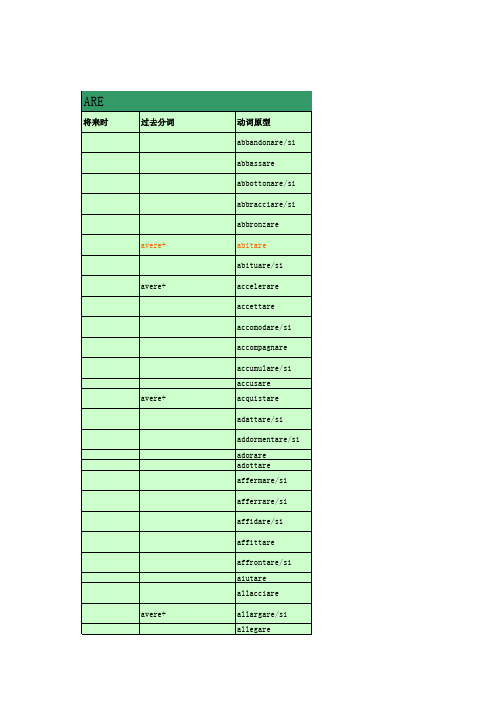
coprire dimagrire dire divertire/si dormire fallire favorire finire fiorire fuggire gestire impedire inserire/si insistere investire morire offrire partire preferire proibire proseguire pulire/si punire restituire riempire/si riuscire salire scoprire seguire sentire/si servire/si smaltire soffrire spedire trasferire/si uscire venire vestire/si
avere+ avere+
avere+soddisfatto
avere+ starò
avere+
avere+tardato avere+
avere+
salutare sbagliare/si scambiare/si scappare scaricare scattare scherzare sciare scusare sdraiare segnare/si sembrare seminare sfogare/si sistemare/si soddisfare sognare sopportare sperare sporcare/si sposare/si sputare stare stirare studiare suonare superare svegliare/si tagliare/si tardare telefonare toccare tornare trascurare/si traslocare trovare truccare/si usare utilizzare viaggiare vietare visitare volare votare vuotare/si
意大利语词汇学习:意大利语动词的用法

意大利语词汇学习:意大利语动词的用法意大利店铺[yidali.]收集整理。
动词Verbi意大利语动词时态比较复杂,共有7个式:直陈式,虚拟式,条件式,命令式,动词不定式,分词,副动词.每个式都有两个或两个以上的时态,大多数时态都有6个人称.所以动词的变化繁锁是学习意大利语语法的最大难点,不过不要怕,我看意大利人也不一定完全弄得明白这些,先看一下时态表:式时态现在过去将来直陈式现在时过去未完成时简单将来时先将来时现在完成时(近过去时)过去完成时(远过去时,绝对过去时)近愈过去时远愈过去时虚拟式现在时过去未完成时过去时过去完成时条件式现在时(简单式) 过去时(复合式)命令式现在时将来时动词不定式现在时过去时分词现在分词过去分词副动词现在时(简单式) 过去时(复合式)再看一下动词的变位:动词变位分为规则和不规则,规则的动词有三种变位法:1)以-are结尾的动词属第一变位法2)以-ere结尾的动词属第二变位法3)以-ire结尾的动词属第三变位法直陈式是一种一般叙述的形式,包括8个时态,是一个常用的动词的式,其现在时规则变位举例如下:第一变位法第二变位法第三变位法guardare看 vivere生活 aprire开 finire结束io guardo vivo apro finiscotu guardi vivi apri finiscilui lei guarda vive apre finiscenoi guardiamo viviamo apriamo finiamovoi guardate vivete aprite finiteloro guardano vivono aprono finiscono注意:复数第三人称重音一般落在倒数第三音节上从变位构成看,动词分为简单式和复合式两种:如直陈式现在进就是简单式,即由动词本身变化词尾而成;而直陈式现在完成时就是复合式: ho guardato(我看了). 复合式是由助动词加上动词的过去分词构成的.意大利语最常用的助动词有两个:avere和essere:avere原意为"有",一般作及物动词的助动词;如:lavare(洗),它的过去分词是lavato,它的直陈式现在完成时就是:avere(变位,六个人称)+lavatoessere 原义为"是",一般作不及物动词的助动词. 如:adnare(走) ,它的过去分词是andato(-a,-i,-e),它的直陈式现在完成时的构成为:essere(变位,六个人称)+andato(-a,-i,-e),当essere作助动词的时候,过去分词的性数要与主语的一致辞.意大利语动词的7个式中,4个是限定形式,即有人称变化,它们是:直陈式,虚拟式,条件式和命令式; 3个是不限定形式,即无人称变化,它们是动词不定式,分词和副动词.1)直陈式有人称变化,直陈式是一种一般叙述的形式,包括8个时态:(1)现在时,表示现在发生的动作,现阶段反复发生的动作及最近就要发生的动作,如:Stamattina vado da lui.今天早晨我去他那儿.Ogni mattina si alza alle sei. 他每天早晨六点起床.(2)表示过去的时态共有5个:(a)近过去时(现在完成时)表示动作刚完成,如:Ho scritto una lettera.我写了一封信.(b)过去未完成时,表示过去发生的动作,但强调动作的过程,或表示过去反复发生的动作:Ieri c’era molta gente.昨天人很多.L’anno scorso andava a letto tardi.去年他每天睡得很晚.(c)远过去时表示过去发生的动作,其结果与今天无关系.这时态用得很少.Lui nacque nel 1563. 他出生于1563年(d)近愈过去时表示发生在一个过去时动作之前的动作.Ieri ha detto che l’altro ieri aveva compra to un libro .他昨天说前天买了一本书.(e)远愈过去时表示发生一个远过去时之前的动作.Dopo che ebbi fatto questa cosa,lui ando subito via. 我做了这件事这后,他马上就走了.(3)将来时,有两个时态(a)简单将来时表示将来要发生的动作,并强调将来,或说话人推测要发生的动作.Domani partirà 他明天出发Avrà 30 anni. 他可能有30岁.(b)先将来时表示先于简单将来时的动作,常由dopo che 或quando引出用在时间从句中,主句的动词为简单将来时.先将来时单用时常表示说话人推测某动作已完成,如:Dopo che avrà dato la risposta, decideremo subito.他给了答复之后,我们将马上决定.Sarà arrivata. 她可能已经到了.2)虚拟式有人称变化,表示主观感觉的不肯定动作,共有四个时态.(1)现在时E meglio che lui venga di persona.他最好亲自来.(2)过去时共有3个时态:(a)过去未完成时表示过去主观感觉的不肯定动作.Era meglio che venisse di persona.那时他应当自已亲自来.(b)去过时(现在完成时)表示主观感觉已经发生了的动作.Credo che lui abbia capiot.我想他懂了.(c)过去完成时表示一个过去完成的虚拟动作.Credevo che lui avesse capito.我原以为他懂了呢.3)条件式有人称变化,单用表示婉转的口气,另外还常与虚拟式配合使用,组成假设句.有二个时态:1)现在时,也叫条件式简单式Vorri un caffe.我想要个咖啡.Se non ci fosse il sole, non ci sarebbe neanche questo mondo.没有太阳,也就没有这个世界.2)过去时,也叫条件式复合式,有三个用法:第一个用法与现在时的用法相同,只不过动作是发生在过去;第二个用法是表示过去,现在,将来没有守现或不可能实现的动作;第三个用法是表示过去中的将来.第一用法:Se ieri avesse fatto bel tempo,sarei uscito. 如果昨天天气好,我就出去了.第二用法:E morto. Avre bbe compiuto 100 anni domani. 他死了,明天是他一百岁生日.第三用法:Tre anni fa ha detto che tu saresti venuto. 三年前他说过你来.4)命令式有人称变化,用于祁使句中,表示命令,请求等,共有二个时态.(1)现在时Entri! 您进来.(2)将来时Ci andrai domani!你明天去那儿.5)动词不定式无人称变化,其主要功能是用于前置词后组成不明确从句.不明确从句的形成是当分句的主语与主句的主语一致时,主句的动词与分句的动词用个前置词连接,省去了分句动词的变位.有二个时态.(1)现在时Spero di andare in Italia .我希望去意大利.(2)将来时Credo di aver capito 我想我懂了.6)分词无人称变化,有两个时态:(1)现在分词,常用作名词或形容词,如:insegnante (教员,insegnare)cantante(歌唱家,cantare)partecipante(参与者,partecipare)interessante(有意思的,interessare)(2)过去分词,单用时表示发生在另一个动作之前的动作;它的更重要的用法是与助动词配合组成动词的复合式。
意大利高考语法知识点
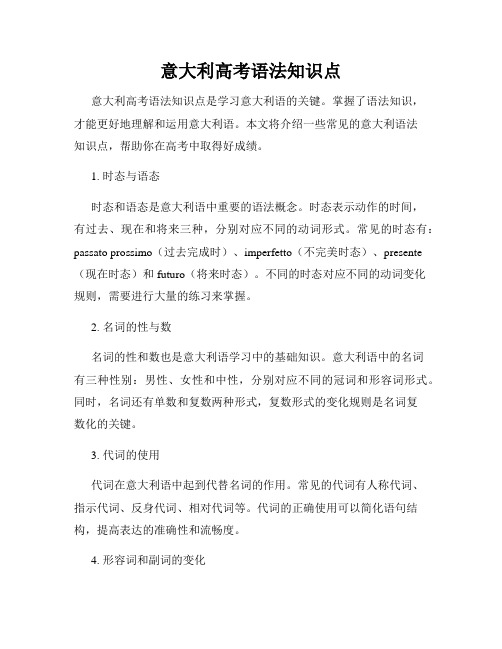
意大利高考语法知识点意大利高考语法知识点是学习意大利语的关键。
掌握了语法知识,才能更好地理解和运用意大利语。
本文将介绍一些常见的意大利语法知识点,帮助你在高考中取得好成绩。
1. 时态与语态时态和语态是意大利语中重要的语法概念。
时态表示动作的时间,有过去、现在和将来三种,分别对应不同的动词形式。
常见的时态有:passato prossimo(过去完成时)、imperfetto(不完美时态)、presente (现在时态)和futuro(将来时态)。
不同的时态对应不同的动词变化规则,需要进行大量的练习来掌握。
2. 名词的性与数名词的性和数也是意大利语学习中的基础知识。
意大利语中的名词有三种性别:男性、女性和中性,分别对应不同的冠词和形容词形式。
同时,名词还有单数和复数两种形式,复数形式的变化规则是名词复数化的关键。
3. 代词的使用代词在意大利语中起到代替名词的作用。
常见的代词有人称代词、指示代词、反身代词、相对代词等。
代词的正确使用可以简化语句结构,提高表达的准确性和流畅度。
4. 形容词和副词的变化形容词和副词是描述名词或动词性质的词汇。
在意大利语中,形容词和副词的变化与名词的性、数和时态有关。
形容词的变化涉及性别和数的变化,而副词则需要根据动词的时态和语态来确定变化规则。
5. 陈述句、疑问句和条件句陈述句、疑问句和条件句是意大利语中常见的句子形式。
陈述句用来陈述事实或描述情况,疑问句用来提问,而条件句用来表达条件和假设。
掌握这些句子形式的语法规则和用法,能够帮助你准确地表达自己的意思和理解他人的话语。
6. 直接间接引语直接引语和间接引语是意大利语中常见的引用方式。
直接引语是直接引用别人的话,一般使用引号括起来;而间接引语是将别人的话转述出来,一般使用连词引导。
掌握这两种引语的变化规则和用法,有助于你正确地引用和解释他人的观点。
7. 连词的使用连词在意大利语中起到连接词组、短语或句子的作用。
常见的连词有并列连词、递进连词、转折连词、条件连词等。
最新意大利语的语态时态
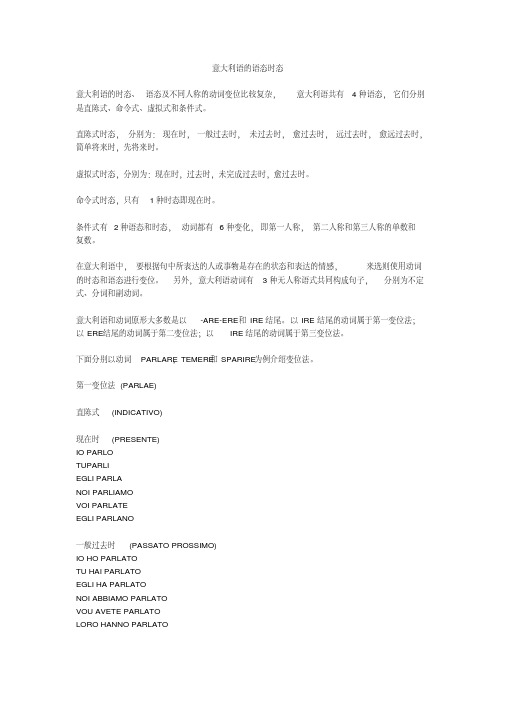
意大利语的语态时态意大利语的时态、语态及不同人称的动词变位比较复杂,意大利语共有4种语态,它们分别是直陈式、命令式、虚拟式和条件式。
直陈式时态,分别为:现在时,一般过去时,未过去时,愈过去时,远过去时,愈远过去时,简单将来时,先将来时。
虚拟式时态,分别为:现在时,过去时,未完成过去时,愈过去时。
命令式时态,只有1种时态即现在时。
条件式有2种语态和时态,动词都有6种变化,即第一人称,第二人称和第三人称的单数和复数。
在意大利语中,要根据句中所表达的人或事物是存在的状态和表达的情感,来选则使用动词的时态和语态进行变位。
另外,意大利语动词有3种无人称语式共同构成句子,分别为不定式、分词和副动词。
意大利语和动词原形大多数是以-ARE-ERE和IRE结尾。
以IRE结尾的动词属于第一变位法;以ERE结尾的动词属于第二变位法;以IRE结尾的动词属于第三变位法。
下面分别以动词PARLARE,TEMERE和SPARIRE为例介绍变位法。
第一变位法(PARLAE)直陈式(INDICATIVO)现在时(PRESENTE)IO PARLOTUPARLIEGLI PARLANOI PARLIAMOVOI PARLATEEGLI PARLANO一般过去时(PASSATO PROSSIMO)IO HO PARLATOTU HAI PARLATOEGLI HA PARLATONOI ABBIAMO PARLATOVOU AVETE PARLATOLORO HANNO PARLATO未完成过去时(INPERFETO)IO PARLAVOTU PARLAVIEGLI PALAVANOI PARLAVAMOVOI PARLAVATELORO ARLAVANO愈过去时(TRAPASSATO PROSSIMO) IO AVEVO PARLATOTU AVEVI PARLATOEGLI AVEVA PARLAONOI AVEVVAMO PARLATOVOI VEVATE PARLATOLORO VEVNO PARLATO远过去时(PASSATO REMOTO)IO PARLAITU PARLASTIEGLI PARONOI PARLAMMOVOI PARLASTELORO PARLARONO愈远过去时(TRAPPASSATO REMOTO) IO EBBI PARLATOTU AVESTI PARLATOEGLI EBBE PARLATONOI AVEMMO PARLATOVOI AVESTE PARLASTELORO EBBERO PARLATO简单将来时(FUTURO SEMPLICE)IO PARLEROTU PARLERAIEGLI PARLERANOI PAREREMOVOI PARLERETELORO PARLERANO先将来时(FUTURO ANTERIORE)IO AVRO PARLATOTU AVRAI PARLATOEGLI AVRA PARLATONOI AVREMO PARLATOVOI AVRETE PARLATOLORO AVRANNO PARLATO虚拟式(CONGIUNTIVO)现在时(PRESENTE)CHE IO PARLICHE TU PARLICHE EGLI PARLACHE NOI PARLIAMOCHE VOI PARLIATECHE LORO PARLIAMO一般过去时(PASSATO)CHE IO ABBIA PARLATOCHE TU ABBIA PARLATOCHE EGLI ABBIA PARLATOCHE NOI ABBIAMO PARLATO CHE VOI ABBIATE PARLATO CHE LORO ABBIAMO PARLATO未完成过去时(IPERFETO) CHE IO PARLASSICHE TU PARLASSICHE EGLI PARLASSECHE NOI PARLASSIMOCHE VOI PARLASTECHE LORO PARLASSERO愈过去时(TRAPASSATO)CHE IO AVESSI PARLATOCHE TU AVESSI PARLATOCHE EGLI AVESSE PARLATO CHE NOI AVESSIMO PARLATO CHE VOI AVESTE PARLATOCHE LORO AVESSERO PARLATO条件式(CONDIZIONALE)现在时(PRESENTE)IO PARLEREITU PARLERESTIEGLI PARLEREBBENOI PARLEREMMOVOI PARLERESTELORO PARLEREBBERO过去时(PASSATO)IO AVREI PARLATOTU AVRESTI PARLATOEGLI AVREBBE PARLATO NOI AVREMMO PARLATO VOI AVRESTE PARLATO LORO AVREBBERO PARLATO命令式(IMPERATIVO)现在时(PRESENTE)TU PARLIEGLI PARLANOI PARLIAOMOVOI PARLATELORO PARLEREBBERO不定式(INFINITO)现在时(PRESENTE) PARLARE过去时(PASSATO)AVERE PARLATO分词(PARTICIPIO)现在时(PRESENTE) PARLANTE过去时(PASSATO) PARLATO副动词(GERUNDIO)现在时(PRESENTE) PARLANDO过去时(PASSATO) AVENDO PARLATO第二变位法(TEMERE)直陈式现在时(PRESENTE)IO TEMOTU TEMIEGLI TEMENOI TEMIAMOVOI TEMETELORO TEMONO一般过去时(PASSATO PROSSIMO) IO HO TEMUTOTU HAI TEMUTOEGLI HA TEMUTONOI ABBIAMO TEMUTOVOI AVETE TEMUTOLORO HANNO TEMUTO未完成过去时(IPERFETTO)IO TEMEVOTU TEMEVIEGLI TEMEVANOI TEMEVAMMOVOI TEMEVATELORO TEMEVANO愈过去时 (TRAPASSATO PROSSIMO) IO AVEVO TEMUTOTU AVEVI TEMUTOEGLI AVEVA TEMTONOI AVEVAMO TEMUTOVOI AVEVATE TEUTOLORO AVEVANO TEMUTO远过去时 (PASSATO REMOTO)IO TEMEITU TEMESTIEGLI TEMENOI TEMEMMOVOI TEMESTELORO TEMERONO愈远过去时(TRAPASSATO REMOTO)IO EBBI TEMUTOTU AVESTI TEMUTOEGLI BBE TEMUTONOI AVEMMO TEMUTOVOI AVESTE TEMUTOLORO EBBERO TEMUTO简单将来时(FUTURO SEMPLICE) IO TEMEROTU TEMERAIEGLI TEMERANOI TEMEREMOVOI TEMERETELORO TEMERANO先将来时(FUTURO ANTERIORE) IO AVRO TEMUTOTU AVRAI TEMUTOEGLI AVRA TEMUTONOI AVREMO TEMUTOVOI AVRETE TEMUTOLORO AVREBERO TEMUTO。
意大利语动词essere和avere各种时态变位大全
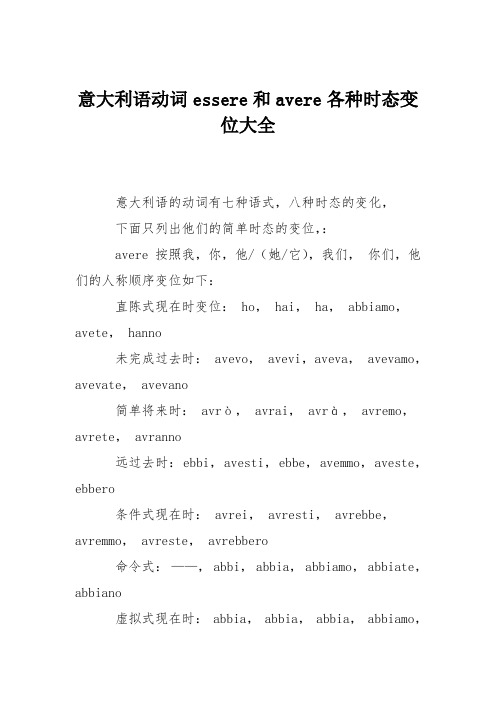
意大利语动词essere和avere各种时态变位大全意大利语的动词有七种语式,八种时态的变化,下面只列出他们的简单时态的变位,:avere 按照我,你,他/(她/它),我们,你们,他们的人称顺序变位如下:直陈式现在时变位: ho, hai, ha, abbiamo,avete, hanno未完成过去时: avevo, avevi,aveva, avevamo,avevate, avevano简单将来时:avrò, avrai,avrà, avremo,avrete, avranno远过去时: ebbi, avesti, ebbe, avemmo, aveste,ebbero条件式现在时: avrei, avresti, avrebbe,avremmo, avreste, avrebbero命令式:——, abbi, abbia, abbiamo, abbiate,abbiano虚拟式现在时: abbia, abbia, abbia, abbiamo,abbiate, abbiano未完成过去时:avessi, avessi, avesse,avessimo,aveste, avessero不定式:avere分词:过去分词:avuto,现在分词:avente .副动词:avendo复合时态构成如下:直陈式近过去时: avere的直陈式现在时变位加上动词的过去分词来构成:例如: ho avuto, hai avuto, ha avuto, abbiamo avuto, avete avuto, hanno avuto近愈过去时: avere的未完成过去时变位加上动词的过去分词来构成远愈过去时:avere的远过去时变位加上动词的过去分词来构成先将来时: avere的简单将来时变位加上动词的过去分词来构成条件式过去时: avere的条件式现在时变位加上动词的过去分词来构成虚拟式过去时: avere的虚拟式现在时变位加上动词的过去分词来构成虚拟式愈过去时: avere的虚拟式未完成过去时变位加上动词的过去分词来构成。
意大利语词汇学习:意大利语动词essere和avere各种时态变位大全
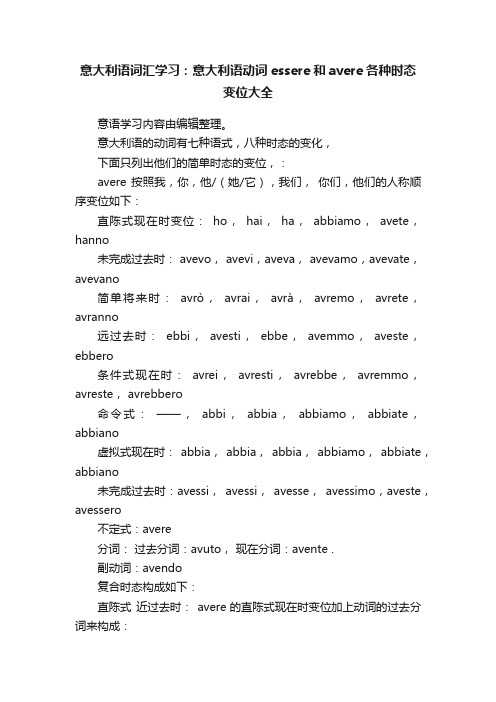
意大利语词汇学习:意大利语动词essere和avere各种时态变位大全意语学习内容由编辑整理。
意大利语的动词有七种语式,八种时态的变化,下面只列出他们的简单时态的变位,:avere 按照我,你,他/(她/它),我们,你们,他们的人称顺序变位如下:直陈式现在时变位:ho,hai,ha,abbiamo,avete,hanno未完成过去时: avevo, avevi,aveva, avevamo,avevate,avevano简单将来时:avrò,avrai,avrà,avremo,avrete,avranno远过去时:ebbi,avesti,ebbe,avemmo,aveste,ebbero条件式现在时:avrei,avresti,avrebbe,avremmo,avreste, avrebbero命令式:——,abbi,abbia,abbiamo,abbiate,abbiano虚拟式现在时: abbia, abbia, abbia, abbiamo, abbiate,abbiano未完成过去时:avessi,avessi,avesse,avessimo,aveste,avessero不定式:avere分词:过去分词:avuto,现在分词:avente .副动词:avendo复合时态构成如下:直陈式近过去时:avere的直陈式现在时变位加上动词的过去分词来构成:例如: ho avuto, hai avuto, ha avuto, abbiamo avuto,avete avuto, hanno avuto近愈过去时:avere的未完成过去时变位加上动词的过去分词来构成远愈过去时:avere的远过去时变位加上动词的过去分词来构成先将来时: avere的简单将来时变位加上动词的过去分词来构成条件式过去时:avere的条件式现在时变位加上动词的过去分词来构成虚拟式过去时:avere的虚拟式现在时变位加上动词的过去分词来构成虚拟式愈过去时:avere的虚拟式未完成过去时变位加上动词的过去分词来构成。
意大利语语法之动词的变位

意大利语语法之动词的变位意大利语语法之动词的变位你知道意大利语中动词的变位是怎样的吗?下面是yjbys店铺为大家带来的关于动词的变位的意大利语语法知识,欢迎阅读。
意大利语中的动词被分为三组(变位)。
动词不定式以-ARE结尾的动词属于第一组:amare, lavorare, mangiare, pensare 等等.动词不定式以-ERE结尾的`动词属于第二组:leggere, vedere, temere, rimanere 等等.动词不定式以-IRE结尾的动词属于第三组:partire, offrire, finire, capire 等等每个动词都由以下部分组成:· 不发生变化的部分 (词根):amare中的am-,temere中的tem-,finire中的fin-· 借以判定动词所属组别的元音 (主题元音):-a-属于第一组变位(am-a-re)-e-属于第二组变位(tem-e-re)-i- 属于第三组变位(part-i-re)· 借以确定语态、时态、人称和数量的可变化部分:-re表明为不定式;-va表明为动词的直陈式第三人称未完成式 (am-a-va), 等等第一组变位的特殊情况以-CARE和-GARE结尾的动词(cercare, pregare),在进行变位时为了保持其软鄂音发音/k/ 和/g/,在以e或i开始的词尾前,需要在动词词根和词尾之间加哑音字母h:cercarecerc-h-i(直陈式现在时,单数第二人称)cerc-h-erò(简单将来时,单数第一人称)pregarepreg-h-i(直陈式现在时,单数第二人称)preg-h-erò (简单将来时,单数第一人称)以-CIARE, -GIARE 和–SCIARE结尾的动词(cominciare, mangiare, lasciare)在变位时如词尾以e或 i开始的话,需要先将词根的i去掉:cominciarecominc-erò(简单将来时,单数第一人称)cominc-iamo(直陈式现在时,复数第一人称)mangiare mang-erò(简单将来时,单数第一人称)mang-iamo(直陈式现在时,复数第一人称)lasciarelasc-erò(简单将来时,单数第一人称)lasc-iamo(直陈式现在时,复数第一人称)以–IARE(inviare, avviare, 等等)结尾的动词如果在进行变位时,如果词根部分的i带有重音,则不能将其去掉,比如:io invìo: tu invii, che essiinviino否则就需要去掉词根原来所带的iio stùdio: tu studi, che essi studino第二组变位的特殊情况以-CERE和-GERE结尾的动词(vincere, piangere)词根在以a或o开始的词尾前发音变为/k/ 和/g/:vincere vinc-o(直陈式现在时,单数第一人称)vinc-a(虚拟式现在时,单数第三人称)piangerepiang-o (直陈式现在时,单数第一人称)piang-a(虚拟式现在时,单数第三人称)以–CERE结尾并且直陈式单数第一人称以–CIO(piaccio)的动词在词尾以元音a, o, u开始时须在词根后加i:PIACERE: piacciano, piacciono, piaciuto.某些动词,如possedere, tenere等等,当重音落在主题元音e上时,该元音变成ie:possièdo, possièdi mapossediàmo, possedétetièni, tiène 但是要用teniàmo, tenéte第三组变位的特殊情况第三组变位里的许多动词都需要在词根与词尾之间插入-ISC:FINIRE: fin-isc-o插入的成份-isc-根据语态和时态有下述插入方式:直陈式现在时,在单数第一、二、三人称和复数第三人称中:io fin-isc-o lui/lei fin-isc-etu fin-isc-i loro fin-isc-ono虚拟式现在时,在单数第一、二、三人称和复数第三人称中:che io fin-isc-a che lui/lei fin-isc-ache tu fin-isc-a che loro fin-isc-ano·命令式,在单数第二、三人称和复数第三人称中:fin-isc-i (tu) fin-isc-a (lui/lei, Lei)fin-isc-ano (loro, Loro)符合上述规则的常见动词有:obbedire, capire, tradire, patire, fallire, definire, abbellire, diminuire, indebolire以及其它许多该组的动词。
意大利语初级语法总结

语法总结一:il presente indicativo(一般现在时)第三人称复数,重音在倒数第三个音节上,其余一般在第二个音节上。
1:verbi regolari (规则动词)2:verbi irregolari (不规则动词)一般现在时25个常用不规则动词的变形二:il passato prossimo(完成式)完成式使用essere的动词(40个)黑体为最常用1:verbi regolari过去分词45个不规则动词变位带“”为不及物动词三:genrundio(现在进行时)1:verbi regolari2:verbi irregolari现在进行时5个不规则动词变位四:il futuro(将来时)1:verbi regolari2:verbi irregolari将来时20个不规则动词变位五:Futuro anteriore (将来完成时)六:L'imperfetto (过去式)1:verbi regolari2:verbi irregolari过去式6个不规则动词变位Per esempio:Ieri sera io erò(essere)a casa,proponevo(proporre)che noi bevevamo(bere)il tè,ma lui diceva(dire)che noi facevamo(fare)i compiti e traducevamo(tradurre)i testi。
七:反身动词反身动词的一般现在时反身动词的完成式八:Particella (小品词)在情态动词时:dovere;potere;volerePer esempio:Io posso aiutare te? =Io posso aiutar ti? =Io ti posso aiutare?Io voglio aspettare te. =Io voglio aspettar ti. =Io ti voglio aspettare.直变间不变(完成式):Per esempio:九:Il condizionale (条件式)与将来时的区别就是后缀变形不同,不规则动词都一样。
意大利语基础单词与日常用语
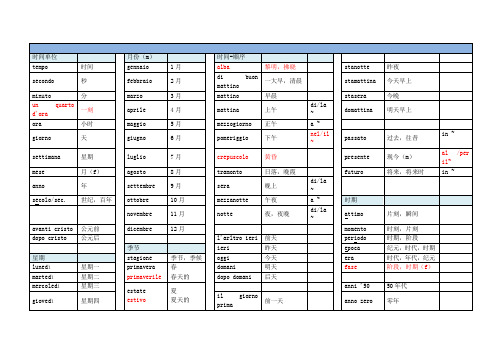
Umbria
翁布里亚
Perugia
佩鲁贾
Ungheria
ungherese
匈牙利
Bisanzio
bizantino
拜占庭
Marocco
marocchino
摩洛哥
germanico
日耳曼
Sardegna
撒丁岛
Cagliari
卡利亚里
Olanda
olandese
荷兰
gallo
高卢
Sicilia
西西里
几点了
anzitutto ...
in/a setembre
triennio
三年
è l'una(in punto/precisa)
1:00(整)
per prima cosa ...
nel 1982,a febbraio
decennio
十年
è l'una e mezzo/mezza
1:30
prima ...
odierno
今日的,现今的
è mezzanotte/zero
24:00
地 理
方位
大洲
nord
settentrione
settentrionale
北,北方(m)
北方的
in basso
在下端,在底部
Europa
europeo
欧洲
in fondo
在尽头,在底部
Asia
asiatico
亚洲
sud
meridione
aprile
4月
mattina
上午
di/la ~
domattina
明天早上
意大利语动词变化规则2

第二类:第二组动词(以ere结尾):一:直陈式(共8个时态)1.直陈式现在时—规则动词去掉词尾ere,按照我-io,你-tu,他/她/您-lui/lei/Lei,我们-noi,你们-voi,他们/您们-loro/Loro六个人称的顺序分别加上o,i,e,iamo,ete,ono.如:ricevere(接受):ricevo,ricevi,riceve,riceviamo,ricevete,ricevono.ripetere(重复):ripeto,ripeti,ripete,ripetiamo,ripetete,ripetono.不规则动词变位:不规则动词往往是一些常用的动词,其变位需死记硬背,没有规律可寻。
最常用的如:avere(有):ho,hai,ha,abbiamo,avete,hanno.essere(是):sono,sei,è,siamo,siete,sono.dovere(应该):devo,devi,deve,dobbiamo,dovete,devono.potere(能够):posso,puoi,può,possiamo,potete,possono.volere(想要):voglio,vuoi,vuole,vogliamo,volete,vogliono.rimanere(留下):rimango,rimani,rimane,rimaniamo,rimanete,rimangono.sapere(知道):so,sai,sa,sappiamo,sapete,sanno.tenere(拿着):tengo,tieni,tiene,teniamo,tenete,tengono. 详见《意大利语语法》P93。
2.直陈式近过去时—它是一个复合时态,由助动词avere或essere的直陈式现在时和动词的过去分词构成,第二组动词的过去分词则是去掉原形动词的词尾ere,加上uto 构成。
意大利语基础单词与日常用语

gli Stati Uniti
americano
美国
Emilia-Romagna
艾米利亚-罗马涅
Bologna
博洛尼亚
Spagna
spagnolo
西班牙
Brasile
brasiliano
巴西
Parma
帕尔玛
Portogallo
portoghese
葡萄牙
Egitto
egizio
埃及
Lazio
拉齐奥
nel febbraio del 1982
ventennio
二十年
sono le 9(in punto/precise)
9:00(整)
prima di ...
nel 1982
sono le 9 e un quarto
9:15
nel dicembre scorso
diurno
白天的
sono le 9 e 15
nottata
一夜,一宵
linea del tempo
时间轴
è ora di ...
oggi è il primo ottobre2012.
le ore piccole
凌晨,午夜以后
mesi e mesi
一连几个月
时间表达
顺序表达
il 18 gennaio,2010
biennio
两年
Che ora è/Che ore sono
rinascimentale
文艺复兴时期的
è mezzogiorno
12:00
il/nel pomeriggio dalle 15 alle 19.
attuale
意大利语的语态时态

意大利语的语态时态意大利语的时态、语态及不同人称的动词变位比较复杂,意大利语共有4种语态,它们分别是直陈式、命令式、虚拟式和条件式。
直陈式时态,分别为:现在时,一般过去时,未过去时,愈过去时,远过去时,愈远过去时,简单将来时,先将来时。
虚拟式时态,分别为:现在时,过去时,未完成过去时,愈过去时。
命令式时态,只有1种时态即现在时。
条件式有2种语态和时态,动词都有6种变化,即第一人称,第二人称和第三人称的单数和复数。
在意大利语中,要根据句中所表达的人或事物是存在的状态和表达的情感,来选则使用动词的时态和语态进行变位。
另外,意大利语动词有3种无人称语式共同构成句子,分别为不定式、分词和副动词。
意大利语和动词原形大多数是以-ARE-ERE和IRE结尾。
以IRE结尾的动词属于第一变位法;以ERE结尾的动词属于第二变位法;以IRE结尾的动词属于第三变位法。
下面分别以动词PARLARE,TEMERE和SPARIRE为例介绍变位法。
第一变位法(PARLAE)直陈式(INDICATIVO)现在时(PRESENTE)IO PARLOTUPARLIEGLI PARLANOI PARLIAMOVOI PARLATEEGLI PARLANO一般过去时(PASSATO PROSSIMO)IO HO PARLATOTU HAI PARLATOEGLI HA PARLATONOI ABBIAMO PARLATOVOU AVETE PARLATOLORO HANNO PARLATO未完成过去时(INPERFETO)IO PARLAVOTU PARLAVIEGLI PALAVANOI PARLAVAMOVOI PARLAVATELORO ARLAVANO愈过去时(TRAPASSATO PROSSIMO) IO AVEVO PARLATOTU AVEVI PARLATOEGLI AVEVA PARLAONOI AVEVVAMO PARLATOVOI VEVATE PARLATOLORO VEVNO PARLATO远过去时(PASSATO REMOTO)IO PARLAITU PARLASTIEGLI PARONOI PARLAMMOVOI PARLASTELORO PARLARONO愈远过去时(TRAPPASSATO REMOTO) IO EBBI PARLATOTU AVESTI PARLATOEGLI EBBE PARLATONOI AVEMMO PARLATOVOI AVESTE PARLASTELORO EBBERO PARLATO简单将来时(FUTURO SEMPLICE)IO PARLEROTU PARLERAIEGLI PARLERANOI PAREREMOVOI PARLERETELORO PARLERANO先将来时(FUTURO ANTERIORE)IO AVRO PARLATOTU AVRAI PARLATOEGLI AVRA PARLATONOI AVREMO PARLATOVOI AVRETE PARLATOLORO AVRANNO PARLATO虚拟式(CONGIUNTIVO)现在时(PRESENTE)CHE IO PARLICHE TU PARLICHE EGLI PARLACHE NOI PARLIAMOCHE VOI PARLIATECHE LORO PARLIAMO一般过去时(PASSATO) CHE IO ABBIA PARLATOCHE TU ABBIA PARLATOCHE EGLI ABBIA PARLATO CHE NOI ABBIAMO PARLATO CHE VOI ABBIATE PARLATO CHE LORO ABBIAMO PARLATO未完成过去时(IPERFETO) CHE IO PARLASSICHE TU PARLASSICHE EGLI PARLASSECHE NOI PARLASSIMOCHE VOI PARLASTECHE LORO PARLASSERO愈过去时(TRAPASSATO) CHE IO AVESSI PARLATO CHE TU AVESSI PARLATO CHE EGLI AVESSE PARLATO CHE NOI AVESSIMO PARLATO CHE VOI AVESTE PARLATO CHE LORO AVESSERO PARLATO条件式(CONDIZIONALE)现在时(PRESENTE)IO PARLEREITU PARLERESTIEGLI PARLEREBBENOI PARLEREMMOVOI PARLERESTELORO PARLEREBBERO过去时(PASSATO)IO AVREI PARLATOTU AVRESTI PARLATO EGLI AVREBBE PARLATO NOI AVREMMO PARLATO VOI AVRESTE PARLATO LORO AVREBBERO PARLATO命令式(IMPERATIVO)现在时(PRESENTE)TU PARLIEGLI PARLANOI PARLIAOMOVOI PARLATELORO PARLEREBBERO不定式(INFINITO)现在时(PRESENTE) PARLARE过去时(PASSATO) AVERE PARLATO分词(PARTICIPIO)现在时(PRESENTE) PARLANTE过去时(PASSATO) PARLATO副动词(GERUNDIO)现在时(PRESENTE) PARLANDO过去时(PASSATO) AVENDO PARLATO第二变位法(TEMERE)直陈式现在时(PRESENTE)IO TEMOTU TEMIEGLI TEMENOI TEMIAMOVOI TEMETELORO TEMONO一般过去时(PASSATO PROSSIMO) IO HO TEMUTOTU HAI TEMUTOEGLI HA TEMUTONOI ABBIAMO TEMUTOVOI AVETE TEMUTOLORO HANNO TEMUTO未完成过去时(IPERFETTO)IO TEMEVOTU TEMEVIEGLI TEMEVANOI TEMEVAMMOVOI TEMEVATELORO TEMEVANO愈过去时 (TRAPASSATO PROSSIMO) IO AVEVO TEMUTOTU AVEVI TEMUTOEGLI AVEVA TEMTONOI AVEVAMO TEMUTOVOI AVEVATE TEUTOLORO AVEVANO TEMUTO远过去时 (PASSATO REMOTO)IO TEMEITU TEMESTIEGLI TEMENOI TEMEMMOVOI TEMESTELORO TEMERONO愈远过去时(TRAPASSATO REMOTO)IO EBBI TEMUTOTU AVESTI TEMUTOEGLI BBE TEMUTONOI AVEMMO TEMUTOVOI AVESTE TEMUTOLORO EBBERO TEMUTO简单将来时(FUTURO SEMPLICE) IO TEMEROTU TEMERAIEGLI TEMERANOI TEMEREMOVOI TEMERETELORO TEMERANO先将来时(FUTURO ANTERIORE) IO AVRO TEMUTOTU AVRAI TEMUTOEGLI AVRA TEMUTONOI AVREMO TEMUTOVOI AVRETE TEMUTOLORO AVREBERO TEMUTO。
意大利语 基础单词与日常用语
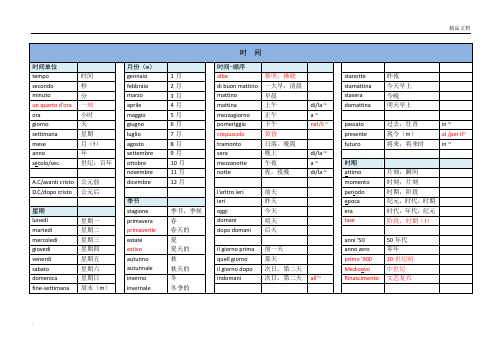
èmezzanotte/zero
24:00
地 理
方位
大洲
nord
settentrione
settentrionale
北,北方(m)
北方的
in basso
在下端,在底部
Europa
europeo
欧洲
in fondo
在尽头,在底部
Asia
asiatico
亚洲
sud
meridione
meridionale
海王星,海神
campagna
乡下,农村
canale
运河,水渠,海峡(m)
Plutone
冥王星
naviglio
可航行的运河
America Latina
拉丁美洲
est
oriente
orientale
东,东方(m)
东方的
prossimo
scorso
下一个/上一个
Antartide
南极洲
precedente
seguente
前面的/以下的
Oceania
大洋洲
anteriore
在前的,前面的
sopra /su
在...上/表面
successivo
陆地,大陆(m)
pianeta
行星(m)
nazione
国家,民族
altopiano
高原
stella
星,明星
repubblica
共和国
pianura
平原
satellite
卫星
comune
市,市政府
campo
田野,场地,领域
capitale
意大利语将来时
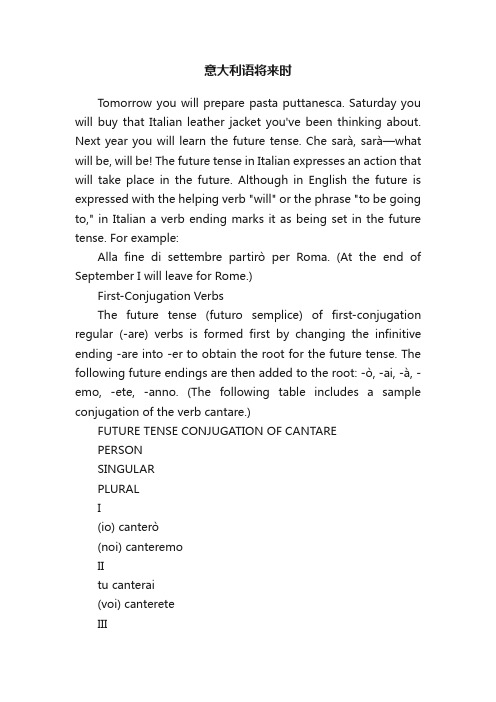
意大利语将来时Tomorrow you will prepare pasta puttanesca. Saturday you will buy that Italian leather jacket you've been thinking about. Next year you will learn the future tense. Che sarà, sarà—what will be, will be! The future tense in Italian expresses an action that will take place in the future. Although in English the future is expressed with the helping verb "will" or the phrase "to be going to," in Italian a verb ending marks it as being set in the future tense. For example:Alla fine di settembre partirò per Roma. (At the end of September I will leave for Rome.)First-Conjugation VerbsThe future tense (futuro semplice) of first-conjugation regular (-are) verbs is formed first by changing the infinitive ending -are into -er to obtain the root for the future tense. The following future endings are then added to the root: -ò, -ai, -à, -emo, -ete, -anno. (The following table includes a sample conjugation of the verb cantare.)FUTURE TENSE CONJUGATION OF CANTAREPERSONSINGULARPLURALI(io) canterò(noi) canteremoIItu canterai(voi) cantereteIII(lui, lei, Lei) canterà(loro, Loro) canterannoSecond- and Third-Conjugation VerbsThe future tense of regular second- and third-conjugation (-ere and -ire) verbs is formed by simply dropping the final -e of the infinitive to obtain the stem and adding to the stem the following future endings: -ò, -ai, -à, -emo, -ete, -anno (the same endings, in fact, as those added to the first-conjugation group). For a sample conjugation, see the table below, which conjugates the verbs credere and partire.FUTURE TENSE CONJUGATIONS OF CREDERE AND PARTIRE PERSONSINGULARPLURALI(io) crederò, partirò(noi) crederemo, partiremoII(tu) crederai, partirai(voi) crederete, partireteIII(lui, lei, Lei) crederà, partirà(loro, Loro) crederanno, partirannoFuture Tense of Irregular VerbsIn the future tense, the verbs dare, stare, and fare simply drop the final -e of their infinitives and form the stems dar-, star- and far-, respectively; the stem of essere is sar-. These stems are then combined with the regular future-tense endings.The verbs listed below also have an irregularly shortened stem in the future tense (usually, because the vowel a or e isdropped from the infinitive).IRREGULAR FUTURE TENSE STEMSINFINITIVEFUTURE STEMandareandr-avereavr-caderecadr-doveredovr-poterepotr-saperesapr-vederevedr-viverevivr-Also be aware of the spelling of verbs with infinitives ending in -ciare and -giare. These verbs drop the i before adding the future endings to the root: tu comincerai, noi viaggeremo. Also, verbs with infinitives ending in -care and -gare add an h to the root for the future to preserve the hard sound of the c or g of the infinitive: io ce rcherò, loro pagheranno.。
意大利语将来时
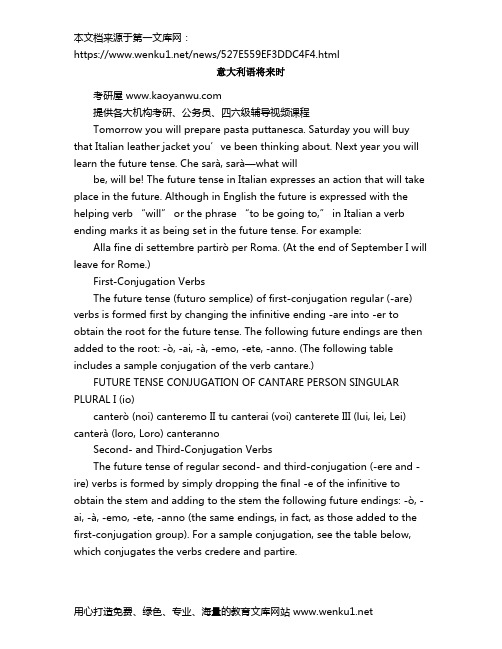
意大利语将来时考研屋 提供各大机构考研、公务员、四六级辅导视频课程Tomorrow you will prepare pasta puttanesca. Saturday you will buy that Italian leather jacket you’ve been thinking about. Next year you will learn the future tense. Che sarà, sarà—what willbe, will be! The future tense in Italian expresses an action that will take place in the future. Although in English the future is expressed with the helping verb “will” or the phrase “to be going to,” in Italian a verb ending marks it as being set in the future tense. For example: Alla fine di settembre partirò per Roma. (At the end of September I will leave for Rome.)First-Conjugation VerbsThe future tense (futuro semplice) of first-conjugation regular (-are) verbs is formed first by changing the infinitive ending -are into -er to obtain the root for the future tense. The following future endings are then added to the root: -ò, -ai, -à, -emo, -ete, -anno. (The following table includes a sample conjugation of the verb cantare.)FUTURE TENSE CONJUGATION OF CANTARE PERSON SINGULAR PLURAL I (io)canterò (noi) canteremo II tu canterai (voi) canterete III (lui, lei, Lei) canterà (loro, Loro) canterannoSecond- and Third-Conjugation VerbsThe future tense of regular second- and third-conjugation (-ere and -ire) verbs is formed by simply dropping the final -e of the infinitive to obtain the stem and adding to the stem the following future endings: -ò, -ai, -à, -emo, -ete, -anno (the same endings, in fact, as those added to the first-conjugation group). For a sample conjugation, see the table below, which conjugates the verbs credere and partire.FUTURE TENSE CONJUGATIONS OF CREDERE AND PARTIRE PERSON SINGULARPLURAL I (io) crederò, partirò (noi) crederemo, partiremo II (tu) crederai, pa rtirai (voi) crederete, partirete III (lui, lei, Lei) crederà, partirà (loro, Loro) crederanno, partirannoFuture考研屋 :提供各大机构考研、公务员、四六级辅导视频课程专业提供提供各大机构考研、公务员、四六级辅导视频课相关文档:∙意大利语直陈式过去时∙意大利语未完成时∙意大利语未完成时变位∙意大利语近过去时∙意大利语未完成过去时变位∙意大利语未完成∙意大利语未完成过去时∙意大利语未完成过去时例句∙意大利语直陈式变位∙意大利语现在时更多相关文档请访问:https:///。
意大利语将来时的用法
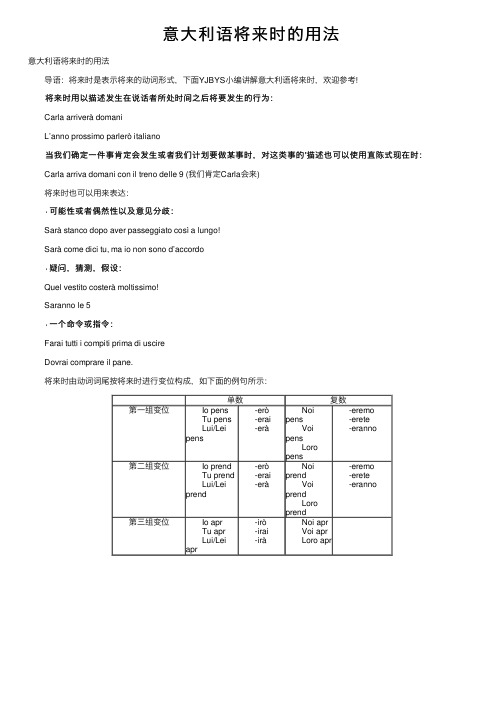
意⼤利语将来时的⽤法意⼤利语将来时的⽤法 导语:将来时是表⽰将来的动词形式,下⾯YJBYS⼩编讲解意⼤利语将来时,欢迎参考! 将来时⽤以描述发⽣在说话者所处时间之后将要发⽣的⾏为: Carla arriverà domani L’anno prossimo parlerò italiano 当我们确定⼀件事肯定会发⽣或者我们计划要做某事时,对这类事的'描述也可以使⽤直陈式现在时: Carla arriva domani con il treno delle 9 (我们肯定Carla会来) 将来时也可以⽤来表达: · 可能性或者偶然性以及意见分歧: Sarà stanco dopo aver passeggiato così a lungo! Sarà come dici tu, ma io non sono d’accordo · 疑问,猜测,假设: Quel vestito costerà moltissimo! Saranno le 5 · ⼀个命令或指令: Farai tutti i compiti prima di uscire Dovrai comprare il pane. 将来时由动词词尾按将来时进⾏变位构成,如下⾯的例句所⽰:单数复数 第⼀组变位 Io pens Tu pens Lui/Leipens -erò -erai -erà Noipens Voipens Loropens -eremo -erete -eranno 第⼆组变位 Io prend Tu prend Lui/Leiprend -erò -erai -erà Noiprend Voiprend Loroprend -eremo -erete -eranno 第三组变位 Io apr Tu apr Lui/Leiapr -irò -irai -irà Noi apr Voi apr Loro apr。
- 1、下载文档前请自行甄别文档内容的完整性,平台不提供额外的编辑、内容补充、找答案等附加服务。
- 2、"仅部分预览"的文档,不可在线预览部分如存在完整性等问题,可反馈申请退款(可完整预览的文档不适用该条件!)。
- 3、如文档侵犯您的权益,请联系客服反馈,我们会尽快为您处理(人工客服工作时间:9:00-18:30)。
意大利语将来时
Tomorrow you will prepare pasta puttanesca. Saturday you will buy that Italian leather jacket you've been thinking about. Next year you will learn the future tense. Che sarà, sarà—what will be, will be! The future tense in Italian expresses an action that will take place in the future. Although in English the future is expressed with the helping verb "will" or the phrase "to be going to," in Italian a verb ending marks it as being set in the future tense. For example:
Alla fine di settembre partirò per Roma. (At the end of September I will leave for Rome.)
First-Conjugation Verbs
The future tense (futuro semplice) of first-conjugation regular (-are) verbs is formed first by changing the infinitive ending -are into -er to obtain the root for the future tense. The following future endings are then added to the root: -ò, -ai, -à, -emo, -ete, -anno. (The following table includes a sample conjugation of the verb cantare.)
FUTURE TENSE CONJUGATION OF CANTARE
PERSON
SINGULAR
PLURAL
I
(io) canterò
(noi) canteremo
II
tu canterai
(voi) canterete
III
(lui, lei, Lei) canterà
(loro, Loro) canteranno
Second- and Third-Conjugation Verbs
The future tense of regular second- and third-conjugation (-ere and -ire) verbs is formed by simply dropping the final -e of the infinitive to obtain the stem and adding to the stem the following future endings: -ò, -ai, -à, -emo, -ete, -anno (the same endings, in fact, as those added to the first-conjugation group). For a sample conjugation, see the table below, which conjugates the verbs credere and partire. FUTURE TENSE CONJUGATIONS OF CREDERE AND PARTIRE
PERSON
SINGULAR
PLURAL
I
(io) crederò, partirò
(noi) crederemo, partiremo
II
(tu) crederai, partirai
(voi) crederete, partirete
III
(lui, lei, Lei) crederà, partirà
(loro, Loro) crederanno, partiranno
Future Tense of Irregular Verbs
In the future tense, the verbs dare, stare, and fare simply drop the final -e of their infinitives and form the stems dar-, star- and far-, respectively; the stem of essere is sar-. These stems are then combined with the regular future-tense endings. The verbs listed below also have an irregularly shortened stem in the future tense (usually, because the vowel a or e is dropped from the infinitive). IRREGULAR FUTURE TENSE STEMS
INFINITIVE
FUTURE STEM
andare
andr-
avere
avr-
cadere
cadr-
dovere
dovr-
potere
potr-
sapere
sapr-
vedere
vedr-
vivere
vivr-
Also be aware of the spelling of verbs with infinitives ending in -ciare and -giare. These verbs drop the i before adding the future endings to the root: tu comincerai, noi viaggeremo. Also, verbs with infinitives ending in -care and -gare add an h to the root for the future to preserve the hard sound of the c or g of the infinitive: io cercherò, loro pagheranno.
备注说明,非正文,实际使用可删除如下部分。
本内容仅给予阅读编辑指点:
1、本文件由微软OFFICE办公软件编辑而成,同时支持WPS。
2、文件可重新编辑整理。
3、建议结合本公司和个人的实际情况进行修正编辑。
4、因编辑原因,部分文件文字有些微错误的,请自行修正,并不影响本文阅读。
Note: it is not the text. The following parts can be deleted for actual use. This content only gives reading and editing instructions:
1. This document is edited by Microsoft office office software and supports WPS.
2. The files can be edited and reorganized.
3. It is suggested to revise and edit according to the actual situation of the company and individuals.
4. Due to editing reasons, some minor errors in the text of some documents should be corrected by yourself, which does not affect the reading of this article.。
